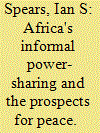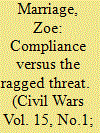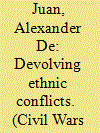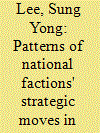| Srl | Item |
| 1 |
ID:
119719


|
|
|
|
|
| Publication |
2013.
|
| Summary/Abstract |
Power-sharing and inclusion continue to inform contemporary approaches to conflict resolution and post-conflict governance in Africa. But aside from power-sharing efforts in relatively well-institutionalized countries such as South Africa and Rhodesia/Zimbabwe, most efforts at formal inclusion have been short-lived. Indeed, many high-profile experiences in power-sharing governments have been failures. African governments and opposition groups do engage in inclusion, but, owing to the non-institutionalized nature of African politics, it is almost always directed toward more limited short-term objectives such as regime survival or material reward that comes with participation in peace processes. Surveying Africa's experience with power-sharing, this article argues that inclusion continues to be a fragile basis on which to build peace.
|
|
|
|
|
|
|
|
|
|
|
|
|
|
|
|
| 2 |
ID:
119718


|
|
|
|
|
| Publication |
2013.
|
| Summary/Abstract |
Northern development policies in African countries affected by war are shaped by security concerns and have neoliberal and realist elements. The neoliberal economic policy purports to be inclusive, but when it meets non-compliance, realist ambitions are pursued through the use or strategic oversight of force. The liberalisation of mining in Katanga, Democratic Republic of Congo, was promoted through northern policy and was exclusive in strengthening unaccountable domestic governance. This marginalised the majority of the population politically and economically and reinforced the international political economy. Consequently, northern intervention has increased insecurity in Congo, and is potentially destabilising in contravening reciprocity in international relations.
|
|
|
|
|
|
|
|
|
|
|
|
|
|
|
|
| 3 |
ID:
119721


|
|
|
|
|
| Publication |
2013.
|
| Summary/Abstract |
Institutions can contribute to regulating interethnic conflict; however, in many cases, they fail to bring about lasting peace. The article argues that the negligence of subgroup identities accounts for some of this failure. Ethnic groups are often treated as unitary actors even though most consist of various linguistic, tribal, or religious subgroups. When interethnic conflict is settled, subgroup differences may come back to the fore. This 'resurgence' can lead to subgroup conflict about the political and economic resources provided through intergroup institutional settlements. This can in turn undermine the peace-making effect of intergroup arrangements. Different subgroup identity constellations make such destructive effects more or less likely. The article focuses on self-government provisions in the aftermath of violent interethnic conflict and argues that lasting intergroup arrangements are especially challenging when they involve 'contested' ethnic groups.
|
|
|
|
|
|
|
|
|
|
|
|
|
|
|
|
| 4 |
ID:
119717


|
|
|
|
|
| Publication |
2013.
|
| Summary/Abstract |
Local communities such as villages are commonly assumed to be vital partners in counterinsurgency and post-conflict reconstruction. However, the success of all policies based on this assumption depends on the level of social cohesion at the community level: communities with internal cleavages and fissures will be less effective in making external efforts a success. In this article, we study how exposure to violence during civil war affects the internal cohesion of a community. On the one hand, we could assume that exposure to a common threat strengthens social ties. On the other hand, shifting power structures in conflict regions could introduce new loyalties and cleavages at the village level, thus eroding a community's social glue. We use data from a survey conducted in northern Afghanistan and combine it with the data on violent events from military records. Our results provide evidence for the second mechanism: exposure to violence causes villagers to diverge in their support for conflicting parties. We estimate a spatial-temporal gravity model, where spatially and temporally proximate events have the highest impact on this divergence at the village level.
|
|
|
|
|
|
|
|
|
|
|
|
|
|
|
|
| 5 |
ID:
119720


|
|
|
|
|
| Publication |
2013.
|
| Summary/Abstract |
By proposing a perception-oriented typology and applying it to the Cambodian peace negotiations, this study attempts to provide an analytic framework for examining the changes in national factions' negotiation strategies during civil war peace negotiation processes. Specifically, this article stresses that domestic negotiating actors readjust their strategies 'phase by phase' according to their subjective consideration of three factors: the contents of the peace proposal, the resources under their control, and the strength of the incentives and pressures from external interveners. Based on this finding, this study further (1) demonstrates that a peace negotiation is a continuous process in which multiple chances for successful conflict resolution also continuously change and (2) highlights the importance of perceptual factors in explaining the behaviour of national factions in peace negotiations.
|
|
|
|
|
|
|
|
|
|
|
|
|
|
|
|